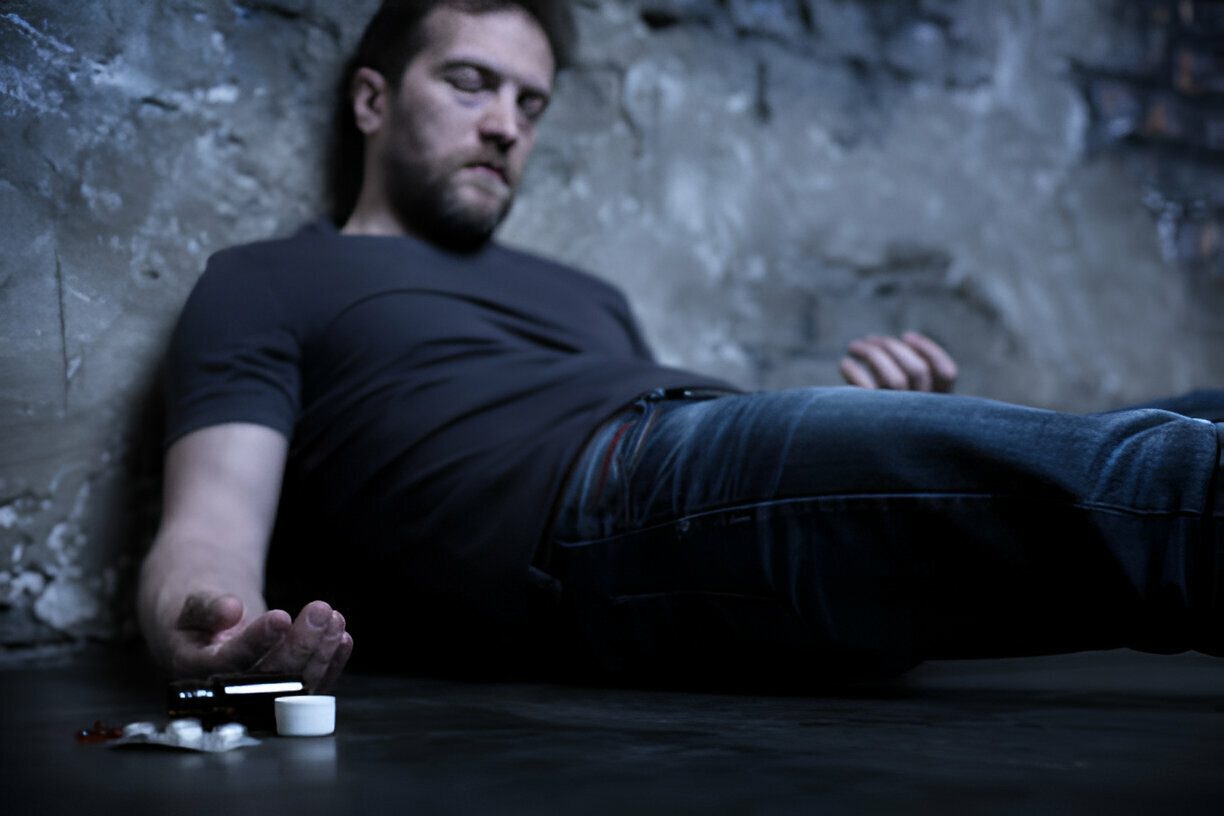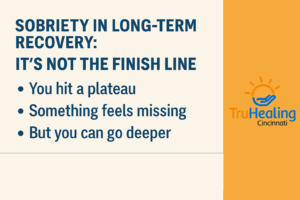You didn’t imagine you’d get clean just to feel numb again.
And yet—here you are. Sober, stable, and somehow still lost.
You’re not using. But you’re not living either.
That’s not failure. That’s a signal. And at TruHealing Cincinnati’s addiction treatment center, we take that signal seriously.
Sobriety Isn’t the Finish Line—It’s a Threshold
Getting clean takes incredible effort. You crawled out of the chaos. You found structure. You rebuilt trust. You fought your way back into a version of yourself you could tolerate—maybe even be proud of.
But for many people in long-term recovery, the finish line starts to feel more like a ceiling. You hit a plateau, and the rush of early wins fades. Your relationships may be more stable, your routines more consistent, and your life more manageable—but emotionally? It feels like something’s missing.
If you’ve ever found yourself wondering, “Is this all recovery has to offer?”—you’re not alone. And you’re not broken. You’re overdue for deeper healing.
When the Numbness Creeps In, Don’t Ignore It
This version of stuckness isn’t loud. It’s not a relapse. It’s not chaos. It’s more like an emotional hum you can’t turn off.
You go through your day.
You do what’s expected.
You stay sober.
But you feel… detached. Unplugged. Disconnected from meaning, joy, purpose—maybe even from yourself.
This is where many long-term alumni get blindsided. They’re doing everything “right” and still feel wrong inside. It’s hard to explain. And even harder to admit.
But here’s the truth: early recovery is about survival. Long-term recovery is about aliveness. If your current sobriety only supports the former, you’re missing something essential.
Why Returning to Drug Addiction Treatment Doesn’t Mean You’ve Failed
One of the most harmful myths in the recovery community is that you only need treatment once. That if you did it “right,” you’d never need it again.
That’s simply not true.
Treatment is not a punishment or a one-time event. It’s a resource—a tool you can return to when life shifts, when emotions resurface, or when the version of you who got sober isn’t the version of you who needs help now.
At TruHealing Cincinnati, we welcome long-term alumni who return—not because they’re using, but because they’re ready to grow. Ready to feel more. Ready to stop numbing out while technically doing “well.”
Sometimes, it’s not about staying clean.
It’s about building a life worth staying clean for.
What Treatment Looks Like After the Chaos Ends
If your first treatment experience focused on stabilization—detox, structure, crisis management—this time might feel different. It should.
What many long-term alumni need in this stage isn’t a repeat. It’s a refinement. A deepening.
Here’s what that might look like:
- Individual therapy that goes deeper than cognitive tools and into unresolved trauma, grief, or identity work
- Group process work that fosters authentic connection, not just compliance
- Somatic therapies that help you inhabit your body again—especially if you’ve felt emotionally “offline”
- Spiritual integration that isn’t dogmatic, but personal and curious
- Creative exploration—art, music, writing—as a means to rediscover joy or voice
Many of our clients in this phase aren’t in crisis. They’re in transition. And good treatment should meet you exactly there.
A Different Kind of Craving
Cravings don’t always look like “I want to use.”
Sometimes they sound like:
- “I miss feeling something.”
- “I need a break from this grind.”
- “I want to feel alive again.”
These are real cravings. And left unaddressed, they can become dangerous. Not because you’ll definitely relapse—but because they signal a need you’re trying to ignore.
You can stay sober and still crave escape.
You can stay sober and still feel empty.
But you don’t have to stay there.
You’re Not Too Late, Too Far Gone, or Too “Fine” to Get Help
One of the biggest barriers for emotionally stuck alumni is shame. Shame for not feeling better. Shame for wanting more. Shame for not being “grateful enough.”
It’s easy to gaslight yourself.
Other people would kill for this stability.
You should be thankful.
You shouldn’t need more.
But the absence of crisis isn’t the presence of peace.
You deserve more than survival. You deserve recovery that feels like you.
Whether you’re local or nearby, we support clients seeking drug addiction treatment in Louisville, Kentucky or drug addiction treatment in Lexington, Kentucky, as well as those in Cincinnati and surrounding regions.
Here’s the Truth You Might Need to Hear
Getting sober isn’t the final boss. It’s the first threshold. And it’s okay if you’ve outgrown the version of recovery that first saved you.
You don’t need a crisis to change.
You don’t need permission to want more.
You just need to stop pretending that “fine” is enough.
We see alumni all the time who walk back through the door with years clean and say,
“I’m still not okay. Can we go deeper?”
The answer is yes. Always yes.
Ready to feel connected again?
Call (888) 643-9118 to learn more about our drug addiction treatment services in Cincinnati, Ohio.
Frequently Asked Questions
Do I need to be actively using to qualify for drug addiction treatment again?
No. Many clients return to care while maintaining sobriety. Emotional flatness, spiritual disconnection, or feeling stuck are valid and important reasons to seek support. You don’t have to wait until things get worse.
What kind of support do you offer for long-term sober clients?
We offer deeper-level therapy, group processing, trauma-focused work, and creative or spiritual exploration options. We focus on helping you reconnect with meaning—not just stop a behavior.
Will I have to repeat the same program I did before?
Absolutely not. Our treatment plans are customized to where you are now, not where you were then. Many alumni engage in a blend of therapy, coaching, and group work that reflects their current growth edge—not their past crisis.
Can I work or go to school while getting support?
Yes. Our outpatient and alumni programming is flexible enough to fit your schedule. You don’t have to step away from your life to reengage with your healing.
Is it normal to feel stuck in long-term recovery?
More common than most people admit. Early sobriety often comes with a rush of relief and structure. But as time goes on, unresolved emotional patterns and spiritual stagnation can surface. Feeling stuck is not a sign you did anything wrong—it’s a sign you’re ready for what’s next.


